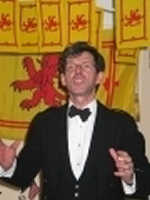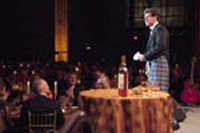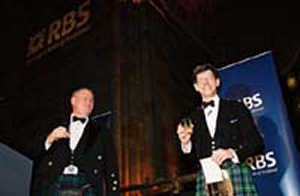|
Edited by Frank R. Shaw, FSA Scot, Dawsonville, GA, USA
Email:
jurascot@earthlink.net
Several years ago,
thanks to Walter Watson, then President of The Robert Burns
World Federation, my wife Susan and I were luncheon guests of a dozen or so
members of The Burns Club of London at the world renown Caledonian Club not
far removed from the very heart of London. Walter had been our superb Burns
Night speaker at our Atlanta Burns Club earlier in the year and he, along
with his lovely wife Liz, had visited with us to see our Burns book
collection. Included with the London invitation and directions to the club
from the Honorary Secretary, Jim Henderson, was this phrase that any
Scotsman worth his salt would love and chuckle over…”There is no sign
outside but the large Saltire over the entrance is as good”.
Those who turned out to greet us were mostly past presidents
and council members of the club. James Fairbairn, then Vice President and
member of the Caledonian Club, had reserved a private dining room, replete
with statuary of Robert the Bruce on horseback which was placed in the
middle of the mantel piece. Not only did we enjoy some of the best haggis
I’ve ever eaten, prepared by their very own Scottish chef, but we met some
of the best Burnsians we’ve ever had opportunity to meet on our trips
throughout America, Europe and, in particular, Scotland and England. It was
at this luncheon that I met Clark McGinn, and we have kept in touch ever
since. It is my pleasure to welcome him to the pages of Robert Burns
Lives! I also look forward to his sharing another article with us in
the future. But first, let me tell you a bit about Clark.
Clark McGinn was born in Ayr and started talking at an early
age (and has hardly stopped since). Educated at Ayr Academy and the
University of Glasgow, where he debated actively: winning the UK national
competition (The Observer Mace), representing the UK (on the ESU Tour of the
U.S.), and founding the World Student Debating Competition (which is now the
second largest student competition in the world and in its 26th year). He
passed enough exams in between speeches and debates to graduate with an MA
with honours in philosophy. He qualified as a banker and has worked in major
institutions in London and New York. He is happily married to Ann and lives
in exile on Harrow-on-the-Hill in North West London. Since 1976 Clark has
performed at Burns Suppers across the globe and is now known as a writer on
Scottish subjects with The Ultimate Burns Supper Book and The
Ultimate Guide to being Scottish, both published by Luath Press.
He is an occasional columnist for the Scottish Government's 'Scotland Now'
e-magazine (http://www.friendsofscotland.gov.uk/scotlandnow/issue-14/index.html)
and has written for The Scotsman and other national newspapers. Clark
supports two charities: The English-Speaking Union and Glasgow University's
development campaign.
INSPIRATION ON INAUGURATION DAY
By Clark McGinn

You can only imagine the feelings a man must have the night
before he is to stand in front of the
American people and take the
Presidential Oath to lead them through the coming four years. Tonight must
be even more tumultuous in Barack Obama’s mind, for tomorrow after 42 white
predecessors and 220 years, a young African American will be watched by the
world as he makes history at the stroke of noon on the Capitol steps.
He may take inspiration from two historical anniversaries
falling over the next weeks: the 200th birthday of Abraham
Lincoln on 12th February and also the 250th
anniversary of Robert Burns this coming Sunday. The first is an obvious
stimulus to Obama because Lincoln is his avowed hero, a fellow Illinois
legislator and the author of the Emancipation Proclamation - it will even be
Lincoln’s bible that is used for the Oath – but beyond the fact that he
enjoys poetry (he is having an Inaugural Poem written as part of the
ceremony) what relevance does Burns have for Obama?
The first reason is the connection between Abe and Rab – for
Lincoln was a lover and capacious recitor of Burn’s poems throughout his
life. He developed his rhetorical prowess by reading, memorising and
spouting almost all of Burns’s longer poems. While splitting rails or
drafting laws, the words of a country lad from Ayshire inspired his
thoughts, so much so that a bust of Rabbie sat prominently in his
presidential office until his murder. Lincoln led the toasts to Burns in
Springfield’s 1859 centenary festival, but he was amazingly self deprecating
when it came to his literary hero, later declining to give the Immortal
Memory speech, saying:
“I can say nothing worthy of his generous heart and
transcendent genius. Thinking of what he has said, I cannot say anything
worth saying.”
And that’s from the author of the Gettysburg Address!


The bond between Burns and the US president goes right back
to the beginning of the office. Ever a man to praise rebellion against
tyranny, it is unsurprising that Burns’s poem to George Washington caught
the first president’s eye. In it, our poet sees the spirit of independence
and the pride of William Wallace reborn on the American continent. Burns
said of it: ‘liberty... you know how dear the theme is to me’ and so, even
as an employee of the defeated King, Robert felt compelled to pen praise to
the farmer who overturned oppression.
As an ordinary man with extraordinary poems, Burns met with
widespread acclaim across the new country - American printers in
Philadelphia and New York were amongst the first to pirate the Edinburgh
edition of the works and it was one of these copies that Thomas Jefferson
gave Washington to read at his Mount Vernon estate.
And here’s a third fan. Jefferson is one of the most gifted
thinkers and writers of his (or any other) day – JFK famously told a White
House dinner of Nobel Prize winners: “I think this is the most extraordinary
collection of talent, of human knowledge, that has been gathered together at
the White House, with the possible exception of when Thomas Jefferson dined
alone.” Yet this planetary brain found solace and challenge in the rhymes
of a man with maybe six months formal schooling all told. Jefferson, who
penned ‘life, liberty and happiness’ also carved ‘ a man’s a man for a’
that’ over his fireplace at home and repeatedly averred that no writer could
eclipse the words and sentiment of a poet born in Scotland, but whose
thoughts reverberated through America and by capturing its dream in verse.
Another president, a Nobel prizewinner himself– Theodore
Roosevelt – was introduced to Burns ‘s works by the Scots-born pioneer of
the national parks, John Muir, whose extraordinary ability to quote the
Bible and Burns in equal measure was in the same league as Teddy’s
photographic memory. The pair of them hiked through Yosemite declaiming
Burns, extolling Scottish scenery and confirming man’s place as part of, not
the owner of, nature.
Four very different men and four very different presidents.
In death they are the four carved into the towering rock of Mount Rushmore,
in life they held a common love of our poet.
It has been a long time since the president has faced such
acute problems at home and abroad, and generations have passed since any
president-elect has borne such a burden of expectation from his people and
the world. Will he read these poems and, like John Steinbeck, be struck by
the ploughman’s words to the mouse he’s upturned?
“But Mousie, thou art no thy lane,
In proving foresight may be vain:
The best laid schemes o' mice an' men
Gang aft agley,
An' lea'e us nought but grief an' pain,
For promis'd joy!”
Or will he look forward and, in the changes he called for – even epitomised
– in his campaign, will he see:
“That Sense and Worth o'er a' the earth
Shall bear the gree an' a' that!
For a' that, an' a' that,
It's comin yet for a' that,
That man to man the world o'er
Shall brithers be for a' that.”
These words
have influenced the greatest of America’s presidents but their real strength
is that many, many ordinary American men and women have been stirred by them
too over these two centuries. At the Burns Centenary in 1859, a US cobbler
said ‘Burns confirms my former suspicion that the world was made for me as
well as for Caesar.” That is the effect Robert Burns has on all of us.
Tomorrow and for the coming four years, let us pray that the
words of Burns will inspire the new President.
©Clark McGinn
(FRS:3.10.09) |

